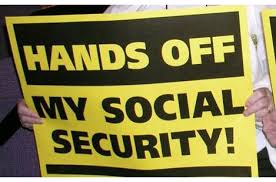
Yesterday, I gave a presentation at a senior apartment center in Spotsylvania. At all of our presentations we pass out cards for seniors who want to share their stories on why they want to protect Social Security. Usually most of the seniors we talk to are eager to fill out the cards.
When we began passing out the cards, only one woman declined filling one out. I sat down next to her and asked her if she needed help writing her card. She looked up at me, took off her glasses, put a hand to her forehead and said, "I can't write this."
She told me that she had immigrated to America with her husband many years ago. She had worked minimum wage jobs her entire life until she could no longer work and her husband died. She could no longer afford to live in her house and was receiving all of her income from Social Security. She was able to receive government help for her apartment.
She told me that the amount of money she gets is enough for a place to live and food, "to fill my stomach, nothing more." She told me that she was afraid that if she spoke up, the little that she had would be taken away. "I know that people in the government don't care about poor people like me. Now I hear them talking about cutting the only money I have and it scares me so much. I feel like there is nothing I can do." I was eventually able to reassure her that nothing bad would come of her writing down her story.
As I was driving back, all I could think about was how this woman felt like she could do nothing even though she was scared of what might happen. I thought about how a full 20 percent of seniors were in this same predicament of relying on meager Social Security checks for all of their income. I thought about how even the meager amount of money Social Security provides keeps 35 percent more seniors out of poverty. I thought about how voiceless they must feel and how those making the decisions about the future of Social Security have no idea what it is like to live like that.
But the woman I spoke to is not alone and thousands of seniors are faced with the reality that any reduction in their monthly payments would mean they may not have a roof over their heads or food on their table. Social Security cuts are not an abstract proposal, and our elected officials should not use them as political bargaining chips. People living on Social Security need more money, plain and simple. Cuts would have real negative effects on the lives of the people who need that money, those who are already the most vulnerable and voiceless among us.
If politicians are willing to cut their benefits without asking the very wealthy to pay their fair share, they will show them that they truly do not care.
Evan McLaughlin is an intern with the Virginia Organizing Social Security summer program. This summer in the Fredericksburg area, you can find Evan giving daily presentations on the future of Social Security.




